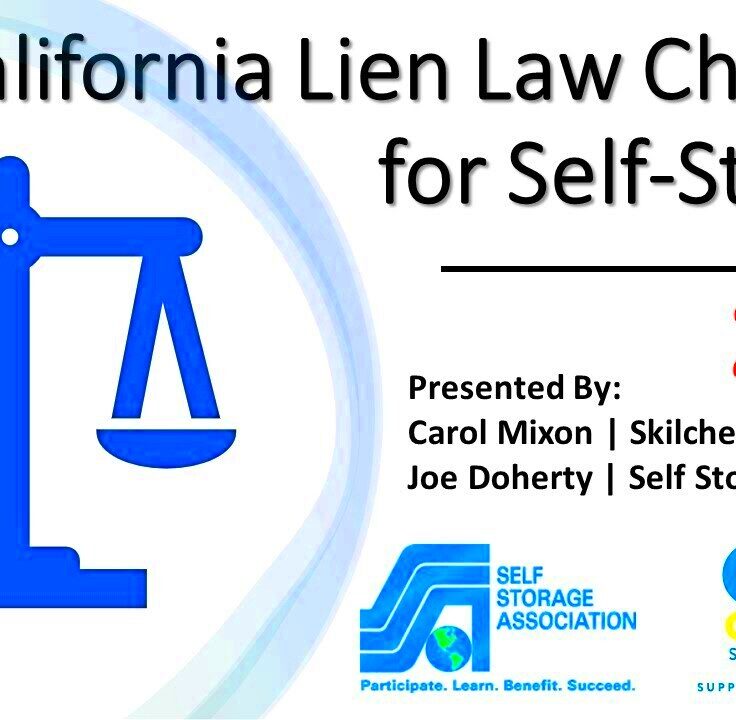Reforming Storage Facility Lien Laws in California
While the topic of storage facility lien laws may seem unexciting it holds significance in regulating the management of storage units when tenants default on payments. In California these laws outline the steps that storage facilities must take before selling a tenants belongings to recover unpaid rent. These regulations are vital, for both storage facility operators and renters as they strike a balance between the need for facilities to recoup expenses and the rights of individuals to safeguard their possessions. Throughout my experiences I’ve witnessed how the intricacies of these laws can affect lives by either alleviating financial burdens or causing added stress during challenging periods.
Current Regulations Governing Storage Facility Liens

The rules in California aim to strike a balance between protecting tenants rights and allowing storage facilities to recover unpaid rent. According to the current laws if a renter doesn’t make a payment for a period the storage facility has the option to put a lien on the belongings stored. Here are the points to note:
- Notice Requirements: The facility must provide a written notice to the tenant, detailing the amount due and the deadline for payment.
- Auction Process: If payment is not made, the facility can auction off the items, typically after a 14-day notice period.
- Public Sale: Auctions are generally conducted publicly, allowing potential buyers to bid on the items.
- Proceeds Allocation: The money from the sale is used to cover the unpaid rent, auction costs, and sometimes, any additional fees.
These rules are meant to safeguard both sides, but they can come across as inflexible or not quite clear enough. I’ve listened to tales from friends and clients who found the process challenging, thinking that the laws were either too severe or didn’t fully consider their circumstances.
Reasons for Reforming Storage Facility Lien Laws
The push for changing storage facility lien laws usually comes from a wish to fix perceived unfairness or ineffectiveness in how things work now. Some of the motivations behind these changes are.
- Tenant Protection: Advocates argue that current laws can leave tenants vulnerable, especially if they are facing financial hardship. Reforms may aim to provide more leniency or support for individuals in difficult situations.
- Fairness in Auctions: There are concerns about how auctions are conducted and the fairness of the process. Reforms might seek to ensure that items are sold at fair market value and that tenants have a clearer path to reclaim their belongings.
- Transparency: There is a push for greater transparency in the lien process. This includes clearer communication and more detailed information about the steps involved.
- Efficiency: Some argue that the current system is cumbersome and could be streamlined to better serve both facilities and tenants.
In my view these adjustments are crucial to keep up with the changing times. I’ve witnessed the impact of outdated rules leading to unnecessary stress and inefficiency. By updating them we can establish a modern approach that considers the needs of everyone involved.
Proposed Changes to Lien Procedures
The suggested revisions to lien processes in California seek to enhance fairness and clarity within the system for all parties concerned. These modifications are prompted by the necessity to rectify certain shortcomings and challenges present in the existing rules. Lets delve into the details of what is being proposed.
- Extended Notice Period: One proposed change is extending the notice period that tenants receive before their items can be auctioned. This gives tenants more time to settle their debts or make arrangements.
- Improved Transparency: The reforms suggest clearer communication about auction details, including how and where the auctions will be held, and providing better documentation of the process.
- Assistance Programs: There’s talk of implementing assistance programs for tenants facing severe financial hardship, offering options like payment plans or temporary relief.
- Online Auctions: To modernize the process, there’s a proposal to move some auctions online, allowing a broader audience to participate and potentially securing better prices for the items.
- Revised Fees: Adjustments to the fees charged during the lien process are also being considered, to ensure they are reasonable and reflect actual costs.
Based on what I’ve encountered these adjustments are essential. I’ve witnessed the impact of an extended notice period giving individuals facing challenges some much needed time. Additionally transitioning auctions to platforms could lead to improved prices and a broader reach.
Impact of Reforms on Facility Owners
Facility owners are bound to notice the impact of these suggested changes and their experiences might differ based on the way in which the modifications are carried out. Here’s a glimpse of how these reforms could affect them.
- Increased Administrative Burden: Extended notice periods and improved transparency could mean more paperwork and administrative work for facility owners. They might need to invest in new systems or processes to manage these changes effectively.
- Potentially Higher Costs: With reforms like online auctions and assistance programs, there might be initial costs involved. However, these could be offset by potentially higher recovery rates from auctions.
- Improved Recovery Rates: Better transparency and online auctions could lead to better prices for auctioned items, improving the recovery rates for facility owners.
- Enhanced Relationships: By adhering to fairer procedures, facility owners can foster better relationships with tenants, potentially reducing conflicts and disputes.
I believe that although the changes may bring about obstacles they also offer facility owners a chance to improve their processes and cultivate stronger more positive connections with their customers.
Impact of Reforms on Tenants
The suggested changes are mainly focused on enhancing fairness and safeguarding tenants. Here’s how these adjustments could be advantageous for renters.
- More Time to Resolve Issues: Extended notice periods give tenants additional time to address their financial issues and avoid losing their belongings.
- Fairer Auctions: Improved transparency and the potential for online auctions can help ensure that tenants’ belongings are sold at fair prices and that the process is handled with greater integrity.
- Support Programs: Assistance programs could provide much-needed support for tenants in financial distress, helping them manage their storage costs more effectively.
- Clearer Communication: With clearer communication about the lien process, tenants will have a better understanding of their rights and the steps they need to take.
In my opinion these changes are an important move to ensure that tenants are treated with greater dignity and respect. Having seen the impact on people dealing with lien problems these reforms can have a positive impact on their lives by giving them more time and assistance during difficult situations.
Legal Challenges and Considerations
Reforming storage facility lien laws can be a tricky process with legal complexities. These changes bring about fresh challenges and factors for both facility owners and tenants to consider. Here are some important aspects to remember.
- Compliance Costs: Adapting to new regulations often requires significant investment in legal consultations, updating systems, and training staff. Facility owners may face financial strain as they work to meet the new requirements.
- Legal Disputes: With changes in the law, there could be an increase in legal disputes as parties adjust to the new rules. Misunderstandings or disagreements about the implementation of new procedures might lead to lawsuits or arbitration.
- Enforcement Issues: Ensuring that all parties adhere to the new regulations can be challenging. Facilities might struggle with enforcing compliance, while tenants may face difficulties understanding and navigating the new processes.
- Balancing Interests: One of the most significant challenges is finding a balance between protecting tenants’ rights and allowing facility owners to recover unpaid rents. The legal reforms need to carefully balance these interests to avoid unintended consequences.
Based on what I’ve witnessed dealing with legal issues can be quite intimidating. I’ve observed numerous clients struggle with the complexities of regulations frequently feeling swamped by the whole process. It’s essential for all parties concerned to obtain guidance to smoothly navigate these changes and make sure that their rights and responsibilities are well defined.
Steps for Compliance with New Regulations
Adjusting to regulations calls for a plan. Here’s a walkthrough to assist facility operators and occupants in adhering to the revised lien laws.
- Review the New Regulations: Carefully read and understand the new laws. Consult legal experts if necessary to grasp all the requirements and implications.
- Update Procedures: Modify existing procedures to align with the new regulations. This may include revising notice templates, updating auction processes, or implementing new administrative practices.
- Train Staff: Ensure that all relevant personnel are trained on the new procedures. This will help in smooth implementation and reduce the likelihood of errors.
- Communicate with Tenants: Inform tenants about the changes in the law and how it will affect them. Clear communication can help prevent misunderstandings and ensure that tenants are aware of their rights and obligations.
- Monitor Compliance: Regularly review and audit compliance with the new regulations. Address any issues promptly to avoid legal complications.
- Seek Professional Advice: Engage legal counsel to navigate any complexities and to stay updated on any further changes in the law.
I believe that being proactive and staying updated is crucial for effectively handling compliance. I have noticed that taking the time to grasp and apply new regulations helps reduce risks and facilitates smoother changes.
FAQ
What are storage facility lien laws?
The regulations regarding storage unit liens outline the steps that storage facilities can take to seize a tenants possessions when they neglect to settle their storage fees. These rules specify the notifications that need to be given the process for conducting auctions and how the proceeds from the sale are allocated.
Why are reforms being proposed for these laws?
Proposed changes aim to tackle concerns like safeguarding tenants ensuring fairness in auctions and enhancing transparency in the lien procedures. The goal is to establish a more equitable framework that takes into account the interests of both storage facility operators and tenants.
How will the proposed changes affect tenants?
The suggested modifications aim to enhance tenant safeguards through longer notice periods, better communication and the implementation of support initiatives. The goal of these adjustments is to give tenants increased time and assistance in addressing their financial challenges.
What steps should facility owners take to comply with the new regulations?
Facility owners are advised to thoroughly examine the updated regulations revise their protocols provide training for their personnel inform tenants about the changes and consistently oversee compliance. Seeking guidance from experts is also suggested to guarantee conformity with the new legislation.
What legal challenges might arise with the new regulations?
Legal hurdles could involve expenses for adhering to regulations possible conflicts enforcement problems and finding a balance between the needs of tenants and facility proprietors. Tackling these obstacles might call for thorough preparation and expert guidance.
Conclusion
Revamping the laws governing storage facility liens in California is a move towards establishing a more equitable and transparent framework for both owners and tenants. These adjustments seek to tackle issues that have persisted for a long time and streamline the process to meet the needs of all stakeholders involved. With longer notice periods, online auctions and improved communication the suggested changes aim to provide better safeguards and assistance. Although there are hurdles to overcome in implementing and adjusting to these new rules they offer a chance for positive transformation. Drawing from my experiences I believe these reforms could enhance fairness and efficiency ultimately benefiting everyone who engages with the storage facility system.


